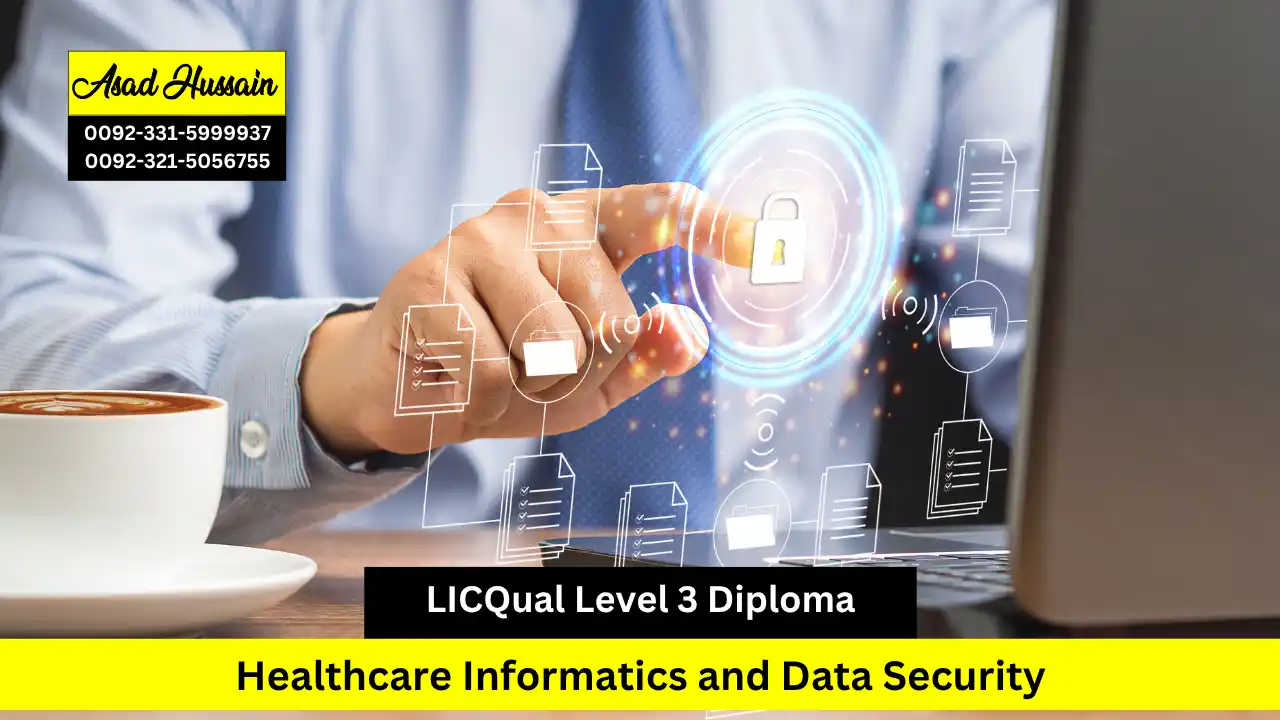The LICQual Level 3 Diploma in Healthcare Informatics and Data Security is a highly relevant qualification designed to address the growing need for secure and efficient management of healthcare data in today’s digital era. With healthcare systems worldwide relying on technology and data-driven decisions, this diploma equips learners with the knowledge to balance innovation with security. It highlights the importance of safeguarding patient information while enhancing the quality of healthcare delivery, making it one of the most in-demand qualifications for those pursuing a career in healthcare technology and information management.
LICQual Level 3 Diploma in Healthcare Informatics and Data Security provide learners with a deep understanding of healthcare information systems, data security principles, and compliance requirements. This course explores both the technical and ethical aspects of handling sensitive healthcare data, preparing learners to contribute effectively in roles that demand accuracy, confidentiality, and advanced digital literacy. The scope of this qualification extends across hospitals, clinics, research organizations, and public health institutions where data-driven strategies are essential.
Through this diploma, learners will gain essential skills in healthcare informatics, including the use of digital systems to manage patient records, analyze data trends, and support evidence-based decisions. Additionally, the course emphasizes practical knowledge in data protection, cybersecurity measures, and risk management specific to healthcare environments. By completing the LICQual Level 3 Diploma in Healthcare Informatics and Data Security, students will be well-prepared to tackle the unique challenges of healthcare data integrity and security compliance.
The program also focuses on developing critical awareness of international standards, data protection regulations, and privacy frameworks that govern healthcare systems. Learners will gain the ability to align healthcare informatics practices with industry requirements such as GDPR, HIPAA, and ISO standards. This ensures that graduates of the LICQual Level 3 Diploma in Healthcare Informatics and Data Security are not only technically skilled but also well-versed in the regulatory frameworks that protect patient data worldwide.
Career progression is a major advantage of this qualification. Graduates of the LICQual Level 3 Diploma in Healthcare Informatics and Data Security can explore diverse opportunities as healthcare data analysts, informatics specialists, compliance officers, or IT security professionals within healthcare settings. The course equips learners with the confidence to pursue higher-level qualifications or to enter professional roles where digital transformation in healthcare is rapidly evolving.
In summary, the LICQual Level 3 Diploma in Healthcare Informatics and Data Security is a comprehensive qualification that bridges healthcare and information technology, ensuring learners are equipped with both technical expertise and ethical responsibility. It prepares individuals to play a crucial role in protecting healthcare data, improving digital systems, and contributing to safer, more efficient patient care. For anyone seeking a career in healthcare informatics or data security, this diploma provides a strong foundation to thrive in a competitive and technologically advanced field.
Program Highlights
Mandatory Units
- Fundamentals of Healthcare Informatics
- Data Protection and Information Governance in Healthcare
- Electronic Health Records and Health Information Systems
- Cybersecurity and Risk Management in Healthcare Data
- Legal and Ethical Considerations in Healthcare Informatics
- Implementation, Evaluation, and Continuous Improvement of Healthcare Data Systems
The LICQual Level 3 Diploma in Healthcare Informatics and Data Security is developed for individuals seeking to build expertise in healthcare information systems, digital data management, and security practices within healthcare environments. This qualification equips learners with the technical knowledge and practical skills required to manage sensitive healthcare data, apply cybersecurity measures, and ensure compliance with international data protection standards. To maintain the academic and professional integrity of this program, specific entry requirements are set to ensure learners are fully prepared to succeed.
Age Requirements
- Applicants must be at least 18 years old at the time of enrolment.
- Candidates under 18 may be considered only with written parental or guardian consent, along with evidence of maturity and readiness for advanced study.
Educational Requirements
- A minimum of a high school diploma (or equivalent) is required.
- Prior study in information technology, healthcare, computer science, or related fields is beneficial but not mandatory.
Professional Experience
- While not compulsory, 1–2 years of experience in healthcare administration, IT support, data management, or cybersecurity is preferred.
- Hands-on exposure to healthcare systems, electronic health records (EHR), or data security frameworks provides learners with a stronger foundation for this diploma.
English Language Proficiency
- Strong English reading, writing, and communication skills are essential to successfully complete this diploma.
- International applicants must provide proof of English proficiency through recognized assessments such as IELTS (minimum score of 5.5) or an equivalent qualification.
Learners who meet these entry requirements will be well-prepared to excel in the LICQual Level 3 Diploma in Healthcare Informatics and Data Security, gaining valuable expertise in digital health systems, cybersecurity, and data protection. This qualification also offers a progression pathway to advanced studies, such as the LICQual Level 4 Diploma in Healthcare Management, allowing learners to expand their career opportunities in healthcare informatics, data governance, and IT-enabled healthcare solutions.heir career prospects and professional recognition in the global healthcare sector.
The LICQual Level 3 Diploma in Healthcare Informatics and Data Security is designed to provide learners with a solid foundation in digital healthcare systems, information governance, and cybersecurity practices. By completing this qualification, learners will gain not only theoretical knowledge but also practical skills to apply healthcare informatics effectively and securely in real-world environments. The following are the detailed learning outcomes for each unit of study.
1. Fundamentals of Healthcare Informatics
- Demonstrate a clear understanding of the role of healthcare informatics in improving patient care, data management, and healthcare delivery.
- Analyze the impact of digital technologies and data-driven decision-making in healthcare systems.
- Apply basic principles of healthcare informatics to organize, store, and retrieve healthcare data effectively.
- Identify the challenges and opportunities associated with integrating informatics into modern healthcare practices.
- Develop awareness of the relationship between clinical operations, data flow, and informatics tools.
2. Data Protection and Information Governance in Healthcare
- Apply best practices for safeguarding patient confidentiality and maintaining secure healthcare data handling.
- Evaluate the principles of information governance and their importance in healthcare settings.
- Demonstrate compliance with national and international data protection regulations, such as GDPR and HIPAA.
- Assess risks related to unauthorized access, data breaches, and improper handling of sensitive healthcare information.
- Implement practical strategies to maintain the accuracy, integrity, and security of healthcare data.
3. Electronic Health Records and Health Information Systems
- Explain the functions, features, and benefits of electronic health records (EHRs) in clinical environments.
- Demonstrate the ability to use health information systems to support clinical decision-making and patient safety.
- Assess the efficiency and challenges of implementing EHR systems in diverse healthcare settings.
- Apply practical skills in managing electronic records, ensuring accuracy, accessibility, and security of healthcare data.
- Evaluate how health information systems contribute to improved communication across multidisciplinary healthcare teams.
4. Cybersecurity and Risk Management in Healthcare Data
- Identify major cybersecurity threats and vulnerabilities affecting healthcare organizations.
- Apply risk assessment techniques to detect and mitigate data security threats within healthcare systems.
- Demonstrate knowledge of cybersecurity tools, protocols, and encryption techniques used in healthcare data protection.
- Evaluate the effectiveness of incident response strategies in addressing data breaches or cyberattacks.
- Develop practical skills in implementing security measures to protect electronic health records and sensitive information.
5. Legal and Ethical Considerations in Healthcare Informatics
- Explain the legal frameworks and compliance requirements that govern healthcare data management.
- Analyze ethical dilemmas related to healthcare informatics, such as patient privacy and data ownership.
- Demonstrate understanding of international standards and policies influencing healthcare informatics.
- Apply ethical decision-making skills in managing healthcare information systems and data.
- Evaluate the responsibilities of healthcare professionals in balancing innovation, patient rights, and data protection.
6. Implementation, Evaluation, and Continuous Improvement of Healthcare Data Systems
- Demonstrate the ability to plan and implement healthcare data systems effectively within an organization.
- Apply evaluation methods to measure the performance and reliability of healthcare informatics solutions.
- Identify gaps and challenges in existing data systems and propose strategies for continuous improvement.
- Utilize feedback mechanisms and performance metrics to enhance healthcare data security and efficiency.
- Develop problem-solving skills to ensure sustainability and adaptability of healthcare information systems.
Upon successful completion of the LICQual Level 3 Diploma in Healthcare Informatics and Data Security, learners will be equipped with the critical knowledge and applied skills to manage healthcare data securely, implement electronic health systems, and comply with international data protection standards. They will also gain the professional competence to handle cybersecurity risks, evaluate healthcare technologies, and make ethically sound decisions in the rapidly evolving field of healthcare informatics. This qualification provides a strong foundation for advancing into higher-level studies or professional roles in healthcare IT, data governance, and healthcare management.
The LICQual Level 3 Diploma in Healthcare Informatics and Data Security is an internationally recognized qualification designed for individuals who want to specialize in healthcare data management, information governance, and cybersecurity practices. In today’s digital healthcare landscape, organizations face challenges such as electronic health record management, data privacy compliance, cybersecurity threats, and regulatory accountability. This diploma equips learners with the expertise to manage sensitive data securely, implement healthcare information systems, and ensure compliance with global standards. It also emphasizes risk management, information governance, and ethical decision-making to strengthen healthcare data integrity and efficiency. By completing this qualification, learners will gain the skills to protect patient data, improve system performance, and contribute to safer, more efficient healthcare delivery worldwide.
Healthcare Data Analysts and Informatics Specialists
- Professionals seeking to specialize in healthcare data management and digital record systems.
- Individuals aiming to use informatics tools to improve patient outcomes and support clinical decisions.
- Learners motivated to align data analytics with evidence-based healthcare practices.
- Informatics specialists working to optimize healthcare data for research, policy, and operational use.
- Professionals committed to improving the accessibility, quality, and security of healthcare information.
- Learners striving to integrate innovation and technology into healthcare informatics.
- Data specialists motivated to balance clinical needs, IT systems, and compliance standards.
- Individuals determined to advance careers in healthcare IT and data-driven healthcare solutions.
Cybersecurity and Information Governance Professionals
- Professionals responsible for safeguarding patient data against unauthorized access and cyber threats.
- Individuals aiming to apply information governance principles to healthcare environments.
- Learners motivated to comply with international data protection regulations such as GDPR and HIPAA.
- Cybersecurity specialists striving to design and implement secure digital healthcare systems.
- Professionals committed to reducing risks of data breaches and strengthening organizational resilience.
- Learners interested in developing expertise in healthcare-specific cybersecurity frameworks.
- Individuals applying best practices to ensure healthcare data integrity and accountability.
- Specialists motivated to integrate compliance, security, and operational efficiency in healthcare IT.
Healthcare Practitioners and Administrators
- Doctors, nurses, and allied health professionals seeking to strengthen digital literacy in data systems.
- Hospital administrators aiming to integrate secure electronic health records into daily operations.
- Public health officers committed to improving healthcare systems through data-driven strategies.
- Learners interested in optimizing healthcare service delivery with secure informatics solutions.
- Professionals dedicated to patient-centered care through effective healthcare data management.
- Administrators responsible for ensuring accurate, accessible, and compliant data storage.
- Practitioners motivated to align healthcare delivery with secure and efficient information systems.
- Learners striving to balance patient care, data protection, and technological innovation.
Policy Makers and Compliance Specialists
- Policy makers committed to strengthening healthcare compliance, governance, and security.
- Specialists striving to ensure transparency and accountability in healthcare data use.
- Professionals applying strategic information governance principles to healthcare policies.
- Individuals responsible for monitoring healthcare data compliance with national and international standards.
- Learners seeking to integrate global best practices into healthcare information governance.
- Policy advisors motivated to enhance patient safety through secure and ethical data systems.
- Specialists dedicated to reducing risks and inequalities through secure healthcare data management.
- Professionals determined to design policies that balance innovation, compliance, and long-term data security.
Career-Focused Learners
- Individuals aspiring to build careers in healthcare informatics, IT security, or data governance.
- Learners motivated to pursue advanced studies in healthcare management, informatics, or data systems.
- Career-driven individuals aiming to strengthen their credentials in healthcare technology.
- Professionals developing analytical, problem-solving, and cybersecurity skills in healthcare contexts.
- Learners seeking expertise in healthcare data security, performance, and risk management.
- Individuals pursuing roles in hospitals, government agencies, NGOs, or international healthcare organizations.
- Career-focused professionals committed to advancing healthcare through technology and security.
- Learners determined to become leaders in healthcare IT, compliance, and data system management.
The LICQual Level 3 Diploma in Healthcare Informatics and Data Security is the ideal choice for learners passionate about healthcare technology, data protection, and information governance. It provides in-depth knowledge, technical expertise, and professional competencies to address challenges such as cybersecurity threats, data privacy, and healthcare system integration. Graduates will be well-prepared to contribute to secure, efficient, and compliant healthcare delivery while pursuing rewarding careers in healthcare informatics, cybersecurity, and data governance.eparedness, and disaster management.







